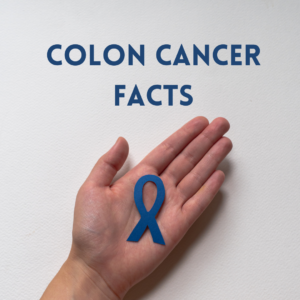
Colorectal cancer (also more commonly referred to as colon cancer) is the fourth-most commonly diagnosed cancer and the second-leading cancer killer in the United States, according to the Centers for Disease Control and Prevention.
What are the chances I will get colon cancer?
Colon cancer affects men and women equally, and your risk increases as you get older.
However, COLON CANCER IS PREVENTABLE. Regular screenings for colon cancer – in the form of a colonoscopy – can detect and remove potential pre-cancerous polyps before colon cancer starts, and detect colon cancer in its earliest stages to treat it with better results.
The 5-year relative survival rate for early-stage colon cancer (stage I and II) is 90 percent. Colon cancer screenings save lives.
What causes colon cancer?
There isn’t a consensus on exactly what causes most colon cancers. According to the Mayo Clinic, colon cancer begins when healthy cells in the colon develop changes in their DNA, then continue to divide and can accumulate into forming a tumor.
What are the risk factors of colon cancer?
Stay informed about your risks to monitor your possibilities to develop colon cancer:
- Age. Although cases are becoming more prevalent in younger ages, everyone should be screened for colon cancer with a colonoscopy by age 45.
- African American race. In general, African Americans have increased prevalence of colon cancer compared to other races…but this may be due to lack of early screenings.
- Personal history. If you’ve already had colon polyps, you remain at increased risk to develop polyps again that could potentially turn into colon cancer.
- Family history. If a close blood relative has or had colon cancer, you may be at increased risk to develop colon cancer yourself.
- Intestinal conditions. Any inflammation in your bowels (like Inflammatory Bowel Disease) should be monitored for colon cancer risk.
- Lack of movement. Regular physical activity helps maintain health in general.
- Low-fiber diet. Fiber helps keep things moving in your intestines and plays a big part in keeping your colon healthy.
What are symptoms of colon cancer?
Most times, colon cancer has no symptoms. Most people don’t feel any polyps in the colon when they develop. However, be mindful of any symptoms and always talk to your doctor if you have:
- Change in bowel habits
- Bloody stools
- Diarrhea
- Constipation
- The feeling your bladder doesn’t empty
- Abdominal pain or cramps
- Unexplained weight loss
Get screened for colon cancer
A colonoscopy is a quick, relatively painless procedure that can PREVENT COLON CANCER. Schedule yours today if you’re 45 (even if you have no symptoms) or have increased risk factors. Our team at Gastrointestinal Specialists, P.C. in Troy, Michigan, is knowledgeable and provides high-quality colonoscopies as our specialty.